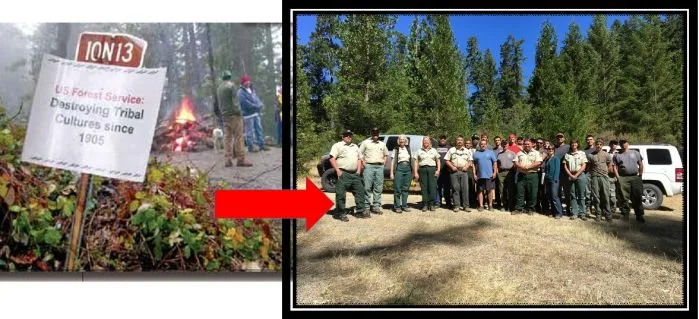Collaboration ≠ Compromise
by Luna Latimer
An incredible change unfolding in the Western Klamath Mountains needs to be celebrated. Five years ago the Western Klamath Restoration Partnership (WKRP) did not exist and trust was in short supply. Proposals like the Orleans Community Fuels Reduction Project stalled out in this environment. Through the WKRP process, the partners have bought into a process where we can build from our common ground, and in which none of us have to give up our values in order to work together. This is a truly collaborative process. “Collaboration” and “Compromise” are terms often confused. But the difference between these two terms is more than semantics. I think the difference between these two words is the reason for the difference in the two press releases for the OCFR project.
At left, Karuk tribal members and concerned citizens blocked a logging road to halt work on the Orleans Community Fuels Reduction Project. At right, several years later, a group of Western Klamath Restoration Partnership participants celebrate work starting on the project with implementation by the Karuk Tribe and MKWC's crews.
The Western Klamath Restoration Partnership (WKRP) launched a precedent-setting phase of the OCFR in 2016. The project is aimed at restoring forests while keeping local communities safe from uncontrolled wildfire. This is a new era for the OCFR - a project that had a rocky start in 2008. The press release last year was titled: Klamath communities collaborate to manage forests and work with fire. Five years ago, the press on this project on page 7 of the Karuk Tribe's newsletter: Karuk Takes on Forest Service: Orleans Community Fuels Reduction Plan Desecrates Sacred Areas.
When we compromise, we may get our needs partially met, but not completely. This is not the WKRP model of collaboration. At WKRP workshops and meetings, there is a culture of only moving forward if we are in agreement. People who work together in this process often say: we “don’t have to give up an arm or a leg” to work together. This model of collaboration represents a breakthrough. So many of us that are working with WKRP on a day-to-day basis take this model of collaboration for granted. Other people may not understand how different this is than previous collaborative efforts on the Klamath. The WKRP seeks to build trust and a shared vision for restoring fire resilience at the landscape scale. There is good reason why these two items – trust and a shared vision – are put together. This Partnership has allowed diverse stakeholders to come together to accomplish work by identifying Zones of Agreement where all parties agree upslope restoration needs to occur. Together, we created a plan for restoring fire resilience at the landscape scale.
Please be a part of this collaborative vision. You can subscribe to semi-monthly e-newsletters by emailing mail@wkrp.network. You can see what is happening on Facebook. The WKRP website will be launching soon, and we’d love for you to browse through it and add your voice to the ongoing dialogue about how to bring good fire back to this place where it once had a major role to play in keeping our forests and communities healthy.
Luna Latimer is a Director of the Mid Klamath Watershed Council. She has worked with MKWC since 2003 when she was doing graduate research with the Orleans/Somes Bar Fire Safe Council. She is a fifth generation forest worker from Southern Oregon and currently lives in Orleans, CA. She received a Master’s degree in Applied Anthropology from Oregon State University with a focus on forest restoration projects on private land within the middle Klamath. Luna works with private landowners, agencies, contractors and non-profit organizations to restore both upslope and in-stream ecosystems.

